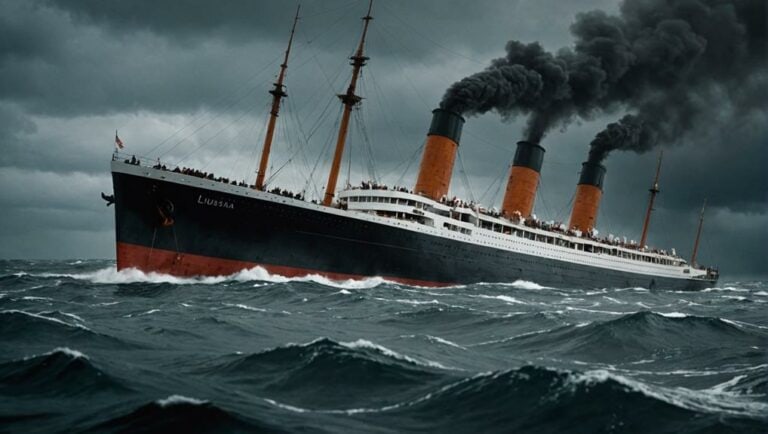The sinking of the RMS Lusitania by a German U-boat on May 7, 1915, resulting in 1,198 deaths, shocked the world and dramatically shifted public opinion in the United States against Germany.
Discover how this tragic event not only influenced America's entry into World War I but also left a lasting impact on international law and military strategy.
Prelude to Disaster
The stage for the Lusitania disaster was set when the British secretly modified the ship for war, escalating tensions and setting a perilous course. After the outbreak of the First World War, the British took measures to arm and prepare their civilian vessels, including the Lusitania, for potential conflict. This decision didn't go unnoticed by German naval commanders, who were well aware that British ships were being equipped for wartime activities.
In response to these modifications, Germany declared the waters around the British Isles a war zone, signaling their intent to attack enemy vessels within this area. German U-boats, the submarines that patrolled these waters, were given orders to strike at British ships without warning, a tactic aimed at disrupting British supply lines and weakening their naval dominance.
The German Embassy in Washington even issued warnings to travelers, cautioning them about the risks of voyaging through these perilous waters. Despite these warnings, the Lusitania continued its transatlantic crossings.
The tension between British maritime strategies and German naval responses laid the groundwork for the tragic events that would follow, culminating in the infamous and devastating attack by a German U-boat.
The Final Voyage
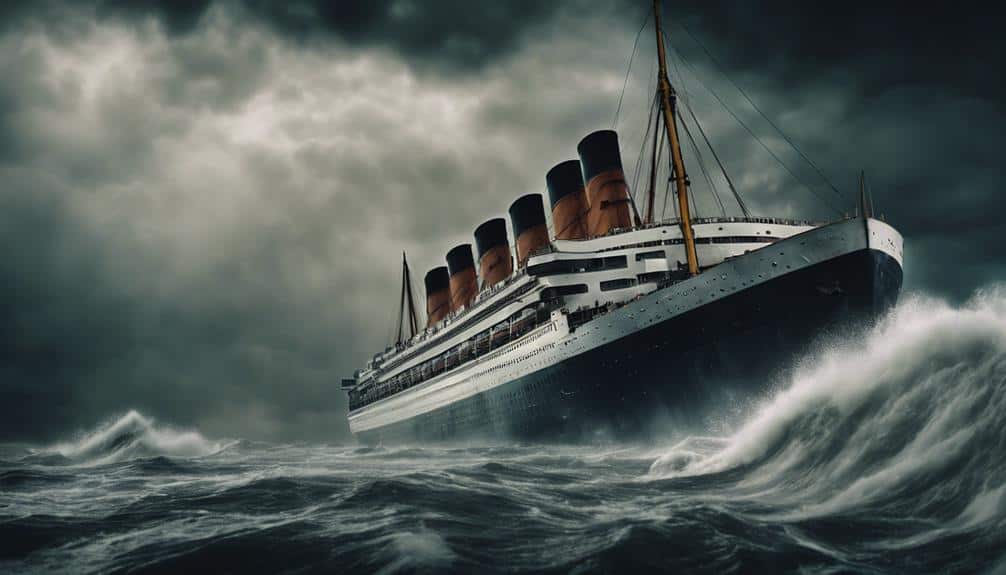
Setting sail on May 1, 1915, the RMS Lusitania's final voyage from New York to Liverpool became a perilous journey through hostile waters marked by heightened submarine threats. The ship carried 1,960 passengers and crew, including 159 Americans and 124 children.
Captain Turner, despite receiving multiple warnings about German U-boat activity, reassured passengers of their safety, believing the ship's speed and evasive maneuvers would suffice. As the Lusitania approached the UK, it encountered the patrolling boarding vessel, the Partridge, and received additional warnings from the Admiralty about the increased risk in the area. These warnings highlighted the imminent danger:
- Presence of German U-boats: Increased sightings and attacks on Allied vessels.
- Specific advisories to avoid certain routes: Recommendations to alter course.
- Heightened state of alert: Instructions to maintain strict vigilance.
- Precautions for additional safety measures: Emphasis on readiness for emergency procedures.
Despite these advisories, the ship pressed on, sailing through waters where German U-boats lurked. Captain Turner's decision to maintain course and speed was guided by confidence in the Lusitania's capabilities. However, this final voyage proved to be a tragic miscalculation, as the ship soon found itself in the crosshairs of a German U-boat, setting the stage for a catastrophic event.
Germany's U-Boat Strategy
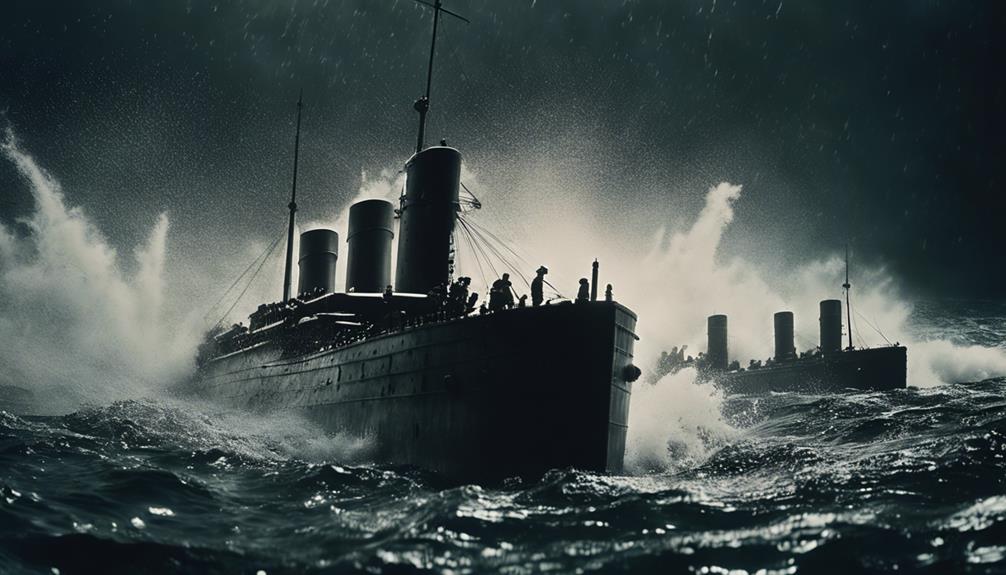
Germany's calculated U-boat strategy, which aimed to cripple Britain's maritime supply routes, directly influenced the perilous environment that the Lusitania encountered on its final voyage. By deploying German submarines, or U-boats, Germany sought to disrupt the flow of essential goods and military supplies reaching Britain. This strategy formed a vital part of the broader U-Boat Campaign during World War I.
The effectiveness of these submarines in targeting merchant ships can't be underestimated. They roamed the seas, sinking vessels that carried supplies essential for the British war effort. The policy of unrestricted submarine warfare, which allowed U-boats to sink ships without warning, escalated the threat to maritime travel. This aggressive tactic was particularly heightened in 1917, almost bringing Britain to a breaking point.
The sinking of the Lusitania by a German U-boat was a direct consequence of this relentless campaign. The attack not only shocked the world but also elicited international outrage. Germany's adherence to unrestricted submarine warfare significantly contributed to tensions between nations, playing a pivotal role in the United States' eventual decision to enter the war.
Understanding this strategy is key to comprehending the broader implications of the Lusitania's tragic end.
The Attack on Lusitania
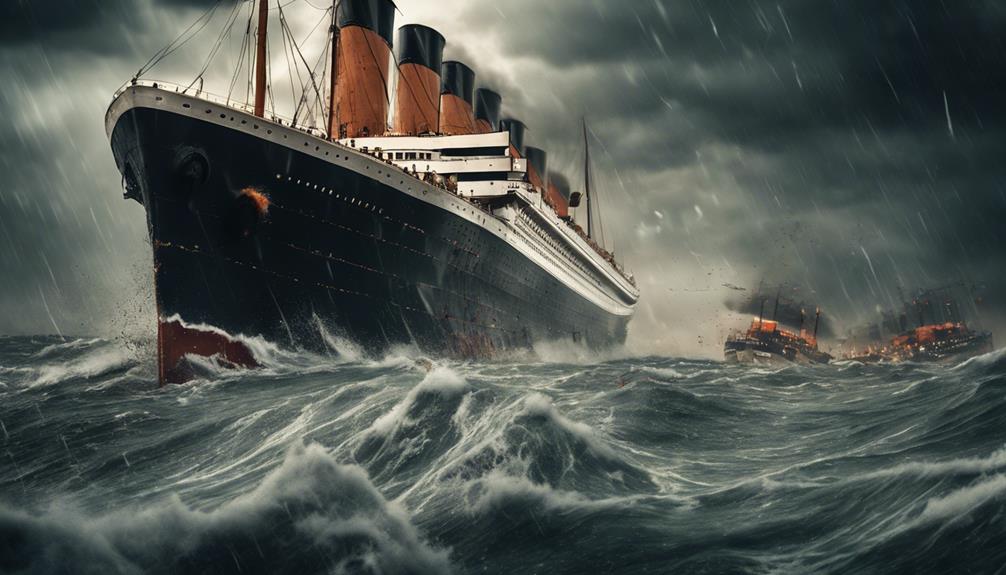
You should first consider the impact of the German torpedo strike on the RMS Lusitania, which resulted in the tragic loss of 1,198 lives. This attack, carried out by U-20, sparked immediate global outrage and heavily influenced public opinion.
Understanding these civilian casualties and the subsequent reactions helps grasp the broader implications of the event.
German Torpedo Strike
On May 7, 1915, a German U-boat, U-20, launched a torpedo that struck RMS Lusitania, leading to its catastrophic sinking within 18 minutes. The attack took place in a declared war zone around the British Isles, where German naval forces had warned that any vessel could be targeted.
The Lusitania, a British passenger liner, was on its way from New York to Liverpool. The German torpedo strike caused an immediate and severe impact, leading to widespread panic and chaos on board. This event drastically shifted public opinion against Germany, particularly in neutral countries.
To understand the significance, consider the following points:
- Declared War Zone: The British Isles were designated a war zone by Germany, making any ship in the area a potential target.
- Passenger Liner: The Lusitania was a civilian vessel, not a military one, carrying nearly 2,000 passengers and crew.
- Speed of Sinking: The ship sank in just 18 minutes, giving little time for evacuation and rescue.
- Public Opinion: The sinking outraged the international community and influenced the United States' eventual decision to enter World War I.
Civilian Casualties Count
The catastrophic sinking of the Lusitania, caused by the German torpedo strike, resulted in the tragic loss of 1,198 civilian passengers and crew members. Among these casualties were approximately 128 American citizens, an aspect that influenced the United States' stance on World War I. This event starkly highlighted the dangers inherent in unrestricted submarine warfare, especially when targeting passenger ships.
The Lusitania was a civilian vessel, and its sinking underscored the indiscriminate nature of submarine warfare, which didn't differentiate between military and non-military targets. Germany defended its actions by claiming that the ship was carrying contraband, thus justifying the attack. However, this rationale did little to mitigate the widespread condemnation that followed, particularly due to the high number of civilian casualties.
This tragic incident not only intensified anti-German sentiment but also profoundly shaped public opinion during the war. The loss of innocent lives, especially American citizens, contributed to a growing outcry against Germany's tactics.
The sinking of the Lusitania remains a poignant reminder of the devastating human cost of war and the ethical dilemmas posed by targeting civilian vessels in conflict zones.
Immediate Global Reaction
One can scarcely overstate the immediate global outrage and condemnation that followed the torpedo attack on the Lusitania by a German U-boat on May 7, 1915. This catastrophic event, which resulted in the deaths of 1,198 passengers, including women and children, caused a seismic shift in public opinion worldwide. The international outrage was swift and fierce, compounded by graphic images of the sinking that circulated rapidly.
The attack on the Lusitania led to an intense wave of anti-German sentiment, particularly in nations already wary of German military actions during World War I. This sentiment was fueled by several key factors:
- Civilian Casualties: The high number of civilian deaths, including many from neutral countries, greatly amplified the global condemnation.
- Media Coverage: Newspapers and other media outlets highlighted the tragedy, swaying public opinion against Germany.
- Political Repercussions: Governments worldwide issued strong statements denouncing the attack, calling for accountability.
- U.S. Involvement: The sinking played a pivotal role in shifting American public opinion, eventually contributing to the U.S. entering World War I.
Analyzing the immediate reactions reveals a world unified in its denunciation of the German U-boat's actions, underscoring the profound impact of the Lusitania's sinking on the global stage.
Immediate Aftermath
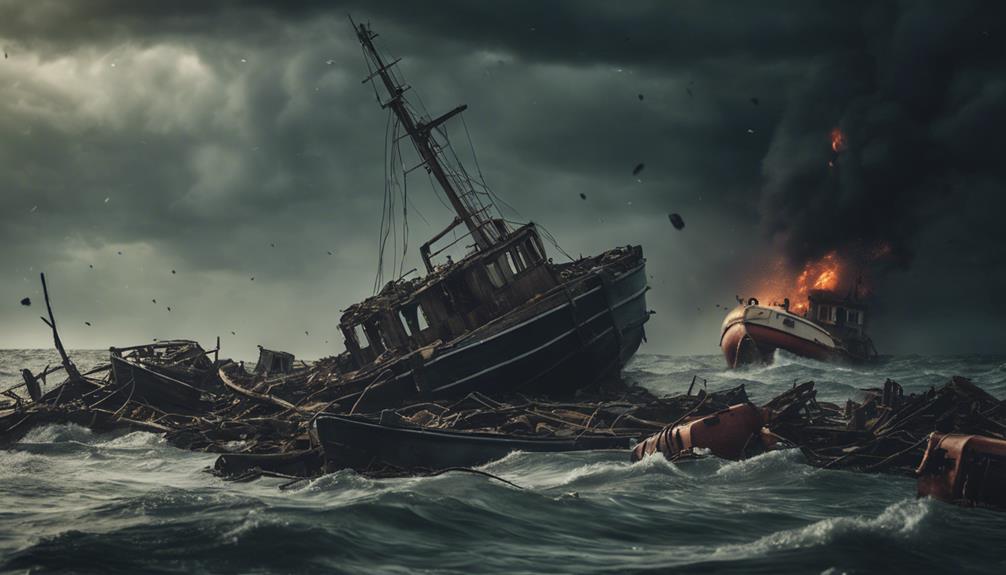
In the immediate aftermath, you see the staggering loss of 1,198 lives profoundly affecting global sentiment. Media coverage amplified public outrage, shaping perceptions and fueling anti-German sentiment in the United States.
Diplomatic tensions escalated, influencing the U.S. trajectory towards entering World War I.
Casualty Statistics and Reactions
Shock and outrage erupted globally as approximately 1,198 passengers perished in the immediate aftermath of the Lusitania sinking. The high casualty statistics fueled widespread reactions, with survivors and witnesses recounting the chaos and devastation. Both passengers and crew were caught off guard by the rapid sinking, leading to a significant loss of life.
The public outcry was immediate and intense. The tragedy prompted swift condemnation of Germany's actions in targeting a civilian passenger ship. British propaganda played a pivotal role in shaping these reactions, highlighting the brutality of the attack to galvanize public opinion.
Key points in understanding the reactions include:
- Immediate Condemnation: Governments and citizens around the world quickly denounced the sinking, demanding accountability.
- Emotional Testimonies: Survivors' harrowing accounts of the disaster amplified the global outrage.
- Political Ramifications: The event strained diplomatic relations and influenced wartime policies.
- Media Amplification: Newspapers and other media outlets disseminated news of the tragedy, fueling the emotional and political responses.
Understanding these reactions helps in grasping the profound impact the Lusitania sinking had on the world stage, contributing to the escalating tensions of the time.
Media Coverage Impact
Newspapers and magazines around the world rapidly disseminated detailed reports and harrowing images of the Lusitania sinking, intensifying public condemnation of Germany's actions. Media coverage was swift and all-encompassing, with journalists providing vivid accounts of the tragedy. This widespread reportage highlighted the tragic loss of life, portraying graphic images and poignant survivor stories that stirred deep emotions.
The media's focus on the blatant violation of maritime laws further fueled public outrage. Headlines screamed of the unethical targeting of a civilian ship, stoking debates about the morality of such wartime tactics. As readers consumed these stories, their sentiments towards Germany shifted dramatically, transforming from neutrality or ambivalence to outright hostility.
The extensive media coverage ensured that the Lusitania disaster dominated public discourse. The detailed reports and emotional images made it impossible for people to ignore the gravity of the event. This, in turn, prompted an outpouring of indignation and sorrow, with many calling for justice and stricter adherence to international maritime laws.
The media's role in shaping public sentiment was undeniable, as it magnified the outrage and framed the Lusitania sinking as a pivotal moment in wartime history.
Diplomatic Consequences
The sinking of the Lusitania immediately strained diplomatic relations between the United States and Germany, prompting President Wilson to issue stern warnings against targeting passenger ships. This catastrophic event pushed the nations to the brink of conflict and led to a series of heated diplomatic exchanges. President Wilson demanded that Germany cease its unrestricted submarine warfare, highlighting the severe diplomatic consequences of their actions.
The diplomatic fallout included:
- Formal Protests: The United States lodged multiple formal protests against Germany, condemning the attack on the Lusitania as a violation of international law.
- Public Outcry: American public opinion turned sharply against Germany, increasing pressure on the government to take a firm stance.
- Policy Shifts: Germany initially promised to alter its submarine warfare tactics to avoid further antagonizing the United States.
- Escalation: Despite temporary diplomatic efforts, Germany's resumption of unrestricted submarine warfare eventually led to the United States entering World War I.
The incident sparked international outrage and condemnation of Germany's submarine warfare tactics. Diplomatic efforts were initiated to address the Lusitania's sinking and its broad impact on global relations. However, the Lusitania tragedy undeniably set the stage for the United States' eventual involvement in World War I, marking a significant shift in the global power landscape.
International Outcry
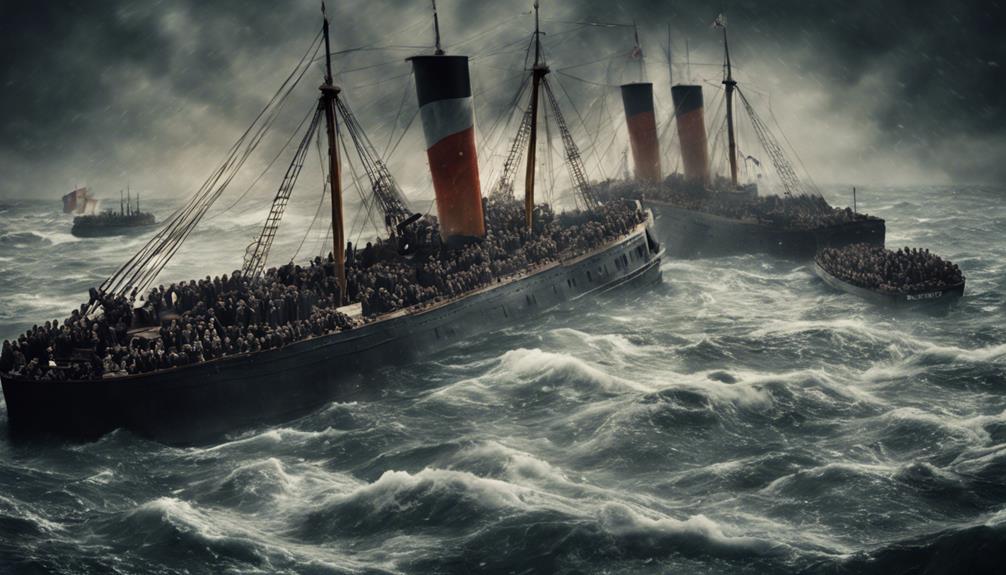
Countries around the globe condemned Germany's actions following the sinking of the Lusitania, sparking an intense international outcry. This tragic event generated significant international outrage, as nations criticized Germany for targeting a civilian ship. The incident intensified anti-German sentiment, particularly in the United States, where calls for involvement in World War I grew louder. The public and political leaders alike debated the legality and morality of attacking civilian ships during wartime, highlighting a significant ethical dilemma.
The tragedy provided fertile ground for propaganda efforts. Governments and media outlets disseminated images and harrowing accounts of the sinking to garner support for the war effort. These efforts aimed to portray Germany's unrestricted submarine warfare as brutal and inhumane, further exacerbating anti-German sentiment. The international community viewed this form of warfare as a direct threat to civilian populations, challenging the norms of engagement during conflict.
The Lusitania disaster underscored the devastating impact of unrestricted submarine warfare. Civilians, who were previously considered neutral parties, became casualties, raising questions about the protection of non-combatants during war. This event not only shifted public opinion but also influenced international diplomatic and military strategies.
Propaganda and Public Opinion
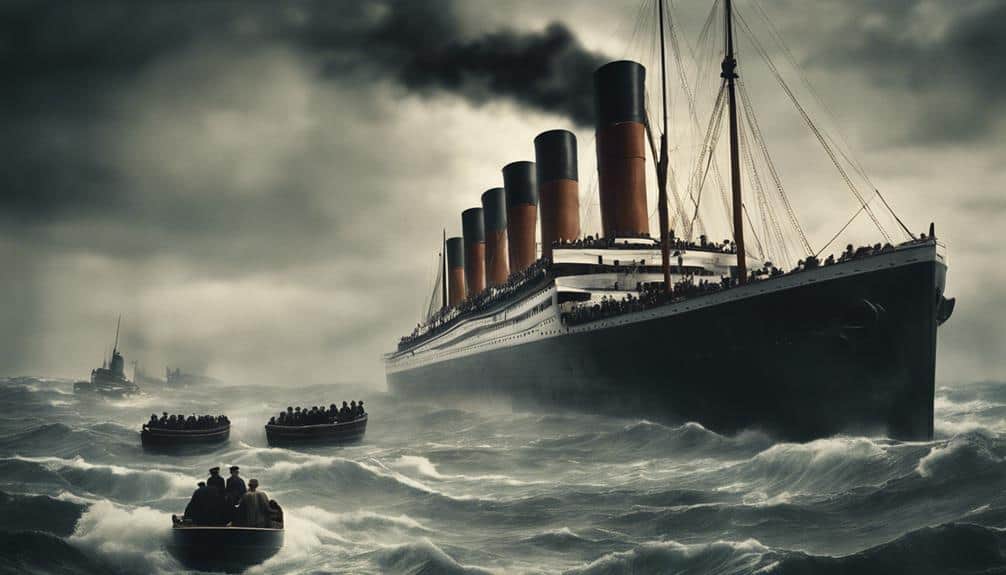
British and American propaganda efforts swiftly leveraged the sinking of the Lusitania to galvanize public opinion against Germany, portraying it as a brutal act that justified increased support for the war. The tragedy became a powerful symbol of German barbarism, fueling anti-German sentiment and rallying support for the Allied forces. By depicting Germany's actions as inhumane and unjustifiable, both nations aimed to strengthen their war efforts and influence the American government to align more closely with the British war cause.
Propaganda played a pivotal role in shaping public opinion. Here's how it was executed:
- Media Campaigns: Newspapers and posters highlighted the loss of civilian lives, often ignoring Germany's claim that the Lusitania carried war munitions.
- Recruitment Efforts: The incident was used to bolster enlistment, leveraging emotional appeals to protect innocent lives.
- Public Speeches: Leaders and influencers delivered impassioned speeches to stir nationalistic fervor and support for the war.
- Cultural Works: Plays, songs, and literature depicted the sinking as a rallying cry against German aggression.
Through these methods, British and American propaganda effectively swayed public opinion, creating a unified front that significantly impacted the war effort.
Impact on American Neutrality
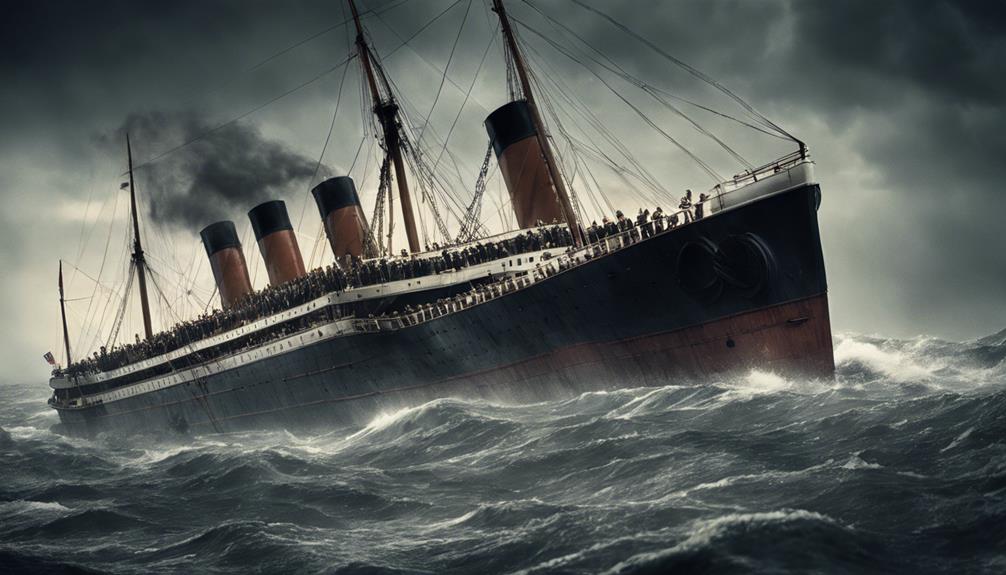
How did the sinking of the Lusitania serve as a pivotal moment in challenging American neutrality during World War I?
The Lusitania incident marked a critical juncture for the United States. Prior to this tragedy, American neutrality was a cornerstone of U.S. foreign policy during the early years of WWI. However, the attack on the civilian passenger ship, which resulted in the deaths of 128 Americans, ignited widespread outrage and a call for action within the United States.
President Wilson faced immense pressure from the American public and policymakers to respond decisively. The sinking strained diplomatic relations between the U.S. and Germany, as Wilson demanded accountability and assurance that such attacks would cease. Germany's refusal to comply fully with these demands and continued unrestricted submarine warfare exacerbated the situation, pushing the U.S. closer to abandoning its neutral stance.
The Lusitania incident was instrumental in shifting American public opinion against Germany. It highlighted the vulnerability of American lives and interests, thereby eroding the foundation of neutrality. This shift in sentiment ultimately set the stage for the United States to declare war on Germany in April 1917, fundamentally altering the course of the conflict and America's role in it.
Legal and Political Repercussions

The sinking of the Lusitania in 1915 prompted significant legal and political debates regarding the legitimacy of targeting civilian vessels in wartime. This tragedy raised numerous legal questions about the wartime conduct of nations, particularly the actions of Germany in attacking the Lusitania. Allegations that the British Admiralty may have been involved in the incident further complicated these discussions.
Key issues that surfaced included:
- The legality of Germany's decision to target a ship carrying civilians, even if it also transported war materials.
- The response of the British Admiralty, which faced scrutiny over whether they adequately protected civilian ships.
- The implications for international maritime law and whether new regulations were needed to protect non-combatant vessels.
- The political ramifications for the United States, which weighed these factors in its eventual decision to enter World War I.
The aftermath of the Lusitania sinking had far-reaching consequences, influencing not only the legal landscape but also the political dynamics of the time. It highlighted the precarious balance between military strategy and humanitarian concerns, and it played an essential role in shifting American public opinion, eventually leading to the United States entry into World War I.
The debates surrounding this event continue to be studied for their enduring impact on international law and wartime conduct.
Legacy and Historical Significance
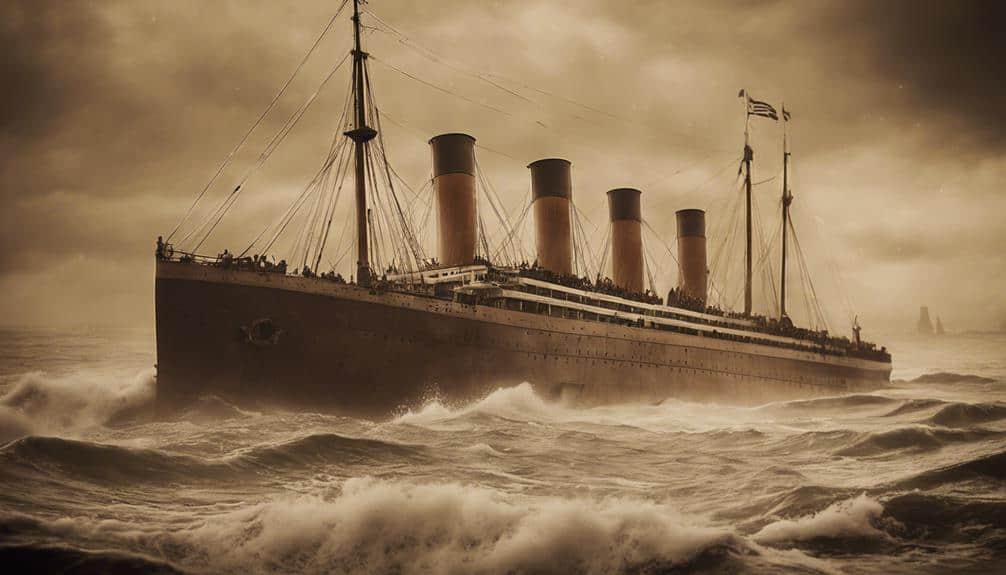
You can't underestimate the profound legacy and historical importance of the Lusitania's sinking, as it fundamentally reshaped international maritime law and altered the political landscape of the early 20th century.
The event was a pivotal moment in the First World War, influencing American neutrality and ultimately swaying public opinion towards entering the conflict. The attack on a civilian vessel by a German U-boat challenged existing norms and led to intense legal debates about the justification for targeting the Lusitania.
International law evolved significantly as a result. The sinking underscored the need for clearer regulations regarding the protection of non-combatant ships, leading to stricter enforcement and new treaties aimed at safeguarding civilian lives during wartime. Admiral Yamamoto, in later years, would reference the Lusitania when discussing the United States' potential responses to aggression, highlighting its lasting impact on military strategy and international relations.
Understanding the historical context of this tragedy is vital. It not only marked a shift in global maritime policies but also demonstrated the power of public sentiment in shaping political decisions. The Lusitania's legacy serves as a stark reminder of how a single event can influence the course of history and international law.


